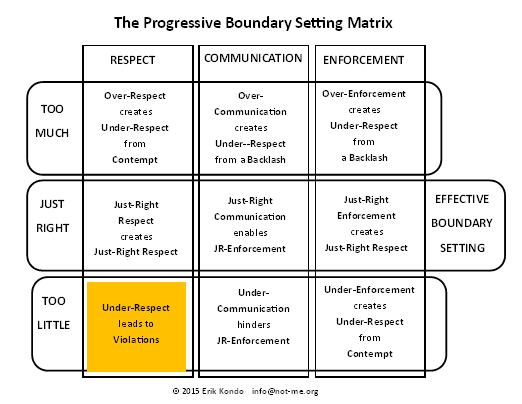Under-Respect is effectively “a lack of Respect“. It comes in many forms. In order to understand Under-Respect, it is necessary to understand Respect. Respect is commonly thought of as “the admiration for someone or something”. But Respect is also a feeling that serves to restrain people. It is a form of self-control. When people are respectful, they are concerned about the consequences of their actions. On the other hand, those that lack Respect, act without concern for the consequence of their actions. Under-Respect can also be characterized as a lack of caring or concern for someone or something. It could also be outright hostility.
Under-Respect doesn’t cause violations. But Under-Respect leads to violations because the “self-restraint” is lower or non-existent. Therefore, a person who lacks Respect for the rules of behavior has less or no reason to NOT violate them if he or she so desires. Respect creates a threshold or boundary that must be crossed for a violation to occur. It takes motivation (intent) to cross the boundary. But the lower the level of Respect, the easier it is to cross the boundary into violation, and the less motivation required to do so.
Some words that describe Under-Respect are: Contempt, Disrespect, Antipathy, Condescension, Defiance, Derision, Disregard, Distaste, Hatred, Malice, Mockery, Neglect, Ridicule, Scorn, Audacity, Aversion, Disesteem, Indignity, Recalcitrance, Repugnance, Slight, Affront, Imprudence, Insolence, Insubordination, Unruliness, Spite, Revolt, Defy, Talk Back, Indiscipline, Noncompliance, Rebellion, and many more.
The fact that there are so many words that describe various aspects of Under-Respect is testimony to how common it is in society.
When a person has Under-Respect for a rule, he or she is more likely to violate that rule.
When a person has Under-Respect for another person, he or she is more likely to violate that person.
Problems of sexism, racism, and ablism are effectively large scale Under-Respect of specific populations due to gender, race, and disability.
The underlying point is that an Under-Respected population is more likely to be violated than a Respected population due to its creation of a lower threshold of boundary restraint. Hence, Under-Respected populations have a higher rate of incidents of violations and in many cases the magnitude of those violations is also greater.
People are also more likely to Respect those that Respect themselves. Therefore, it is also common for victims of violations to have low self-esteem. Said in another fashion, the demographic of people with low self-respect has a high rate of victimization.
Under-Respect is in the eye of the Beholder(s). That means whether or not a person has Under-Respect for someone or something (a rule for example) is a function of how that person feels about that someone or something. But Under-Respect also can be viewed in terms of whether a person feels being Under-Respected by someone or something. A person who feels Under-Respected is more likely to see him or herself as being violated by the very fact of being Under-Respected. But this determination is subjective to the Beholder(s).
Under-Respected populations and people suffer the double wammy of both being structurally (externally) Under-Respected and feeling (internally) Under-Respected which can have the effect of creating lower self-Respect in some. Lower self-Respect leads to less external Respect. Thus perpertuating the downward spiral.
Building Respect for Under-Respected populations and people typically requires both external and internal change. Unfortunately, a tremendous amount of resources are usually spent debating the merits of External Change (society changes) vs. Internal Change (individual changes). External and Internal are seen as mutually exclusive as opposed to complimentary. Usually, the undesired end result of this despute is for the status quo to remain the same.
Respect is an elusive quality. You can demand it, but you may or may not receive it. When the Under-Respect of a population exists due to othering, stereotyping, and bias (ignorance), it is possible to build external Respect through the process of education and promoting empathy. But, without a corrasponding increase in the self-Respect (internal change) of that population, these gains will ultimately be lost.
